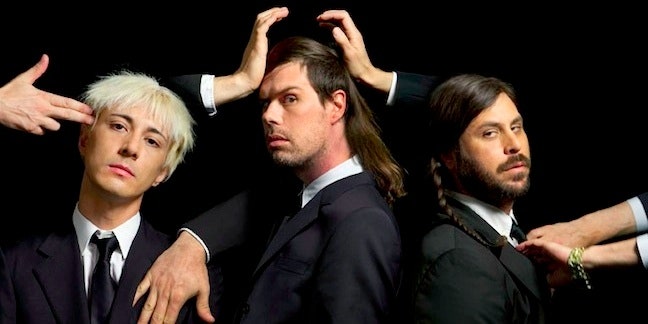Liars: The Apple Drop Interview: 13th Floor
Liars is the musical project of Angus Andrew, originally from The Philippines but grown up in Australia. The new album is The Apple Drop.
The 13th Floor’s Marty Duda spoke to Angus about making The Apple Drop under pending lockdown with two relatively new members and a collaboration with his wife.
Click here to listen to the interview:
Or, read a transcription here:
A: I spent a little time in Poughkeepsie. I did a couple of semesters at a school called Vassar.
M: Oh right. It used to be an all women’s school a long time ago I think.
A: That’s right with some famous women, I believe, although I can’t recall who they are.
M: Well there you go. How was your experience at Vassar?
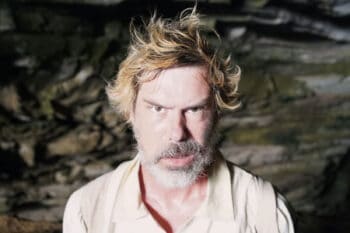 A: It was informative in a sense that it helped me understand what maybe I didn’t want from my education. I don’t know. It was a bit of a shock, the idea that people were going… in the first couple of semesters it’s kind of just like party as hard as you can you know.
A: It was informative in a sense that it helped me understand what maybe I didn’t want from my education. I don’t know. It was a bit of a shock, the idea that people were going… in the first couple of semesters it’s kind of just like party as hard as you can you know.
I had kind of done that before getting to this school so I was a little bit lost. And so I eventually transferred to an arts school in California called California Institute of the Arts and that made more sense to me.
M: How much did that education experience have an effect on what you’re doing with Liars?
A: Well, that’s where it began. At that art school, one of their primary guidelines was that even though there were many schools within the school, like for art, but then also for dance, and then a school for animation, and a school for film, and so they had all these different departments, and their whole creed was that you should try and blur those lines as much as possible sort of thing. That’s really what informed my decision making like I started to make music for the first time when I was at art school even though I was there for photography.
M: What caused you to shift from photography to music then?
A: Well it was, partially this overwhelming idea they had at this school to kind of mix things up but also, I started taking dance classes and I was really interested in performance art at the time. And then there was a class I remember that required some sort of presentation and I chose for the first time, fairly randomly, to work with sound and I created a sound piece and did a performance and that kind of let me…I never looked back from that.
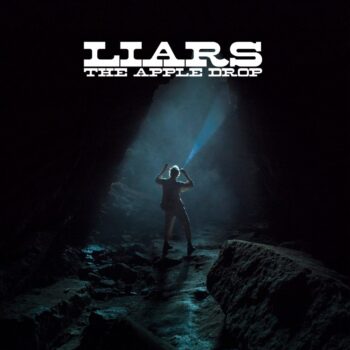 M: And here we are, 20-something years later and we have The Apple Drop.
M: And here we are, 20-something years later and we have The Apple Drop.
A: Exactly. I still have to slap my face every time I realise that’s what’s actually happened to my life.
M: I think I know that feeling. When you get to a certain age you just go what the heck?
So the album was released on the 6th. What was the experience for you putting out this record in this day and time and lockdown and all that stuff?
A: I’ve learnt over the years that my best approach is to ignore everything. I’m really, really good at that now so that I don’t have any idea actually what people were thinking. I do get personal messages from friends and relatives which really is how I judge the world wide reception of the record really. And those notes have been very kind so I’m glad it’s out there. At this point it really, it starts to get exciting for me about what I can start making next.
M: I think one of the things that I read…the reaction was someone thought this was your most approachable album in quite a while. Is that a valid statement or not?
A: It’s an interesting sort of statement when you talk about what is or isn’t approachable. I mean, I guess it depends on who you’re talking to. Look, I definitely think the record is more musical ‘quote unquote’ then maybe I’d gone in the past and that had a lot to do with working with these various skilled and trained musicians.
Laurence (Pike) and Cameron (Deyell) helped me realise sort of musical ideas that I didn’t think I had the skills to achieve sort of thing and so I think the record shows a level of musicianship that might make it more approachable is my guess.
M: What brought you to work with Cameron and Laurence? How did you connect with those guys?
A: I had been touring the previous record to this one and on the Australian leg they played in the live band and so we began just by, you know, playing old Liars material live on stages around Australia and then I suppose just by the sense I got from working with them in that context, I feel like I started to write demos with the idea in mind that they could help me extrapolate on them.
M: Laurence is somewhat known, I guess he plays with Jack Ladder who I think is also putting out a new album next month or so but he’s also known for his other work with PVT and whatever so did you bring him into the fold for his drumming capabilities or just his kind of, musical being?
A: Yeah, also his solo work is really impressive. I actually wasn’t aware of any of that before I met him and we started playing. And then gradually I was, I came to understand that he has connections with pretty much every Australian artist there is which is great.
Initially it was about the drumming but Laurence is a very musical person as is Cameron and the language that they speak is one that I really haven’t spoken before even though I’ve made a ton of music, I just never approached it from a musical standpoint really, it’s always been more of an artistic approach.
So as soon as I started talking to them about music I realised that there was much more to offer than just drumming and playing instruments, it had everything to do with how songs would develop and so we worked together a lot on song structures etcetera.
M: I guess that’s leading to my next question which was, the songs themselves that comprise the album, were they created with their musicality in mind as opposed to what you were doing previously when you were working by yourself?
A: I had written quite a lot of demos and most of them were ideas that I just didn’t know how to develop in a way I could imagine them going. I could see my limitations in the previous way I had been working which was solo and within the computer. So I started to write things with that in mind but we worked on a ton of those ideas.
Some of them worked, some of them didn’t and then there were other instances where a very minor idea of mine, I would bring to them in the studio and we would develop an entire song together. So there was a mix of them. But really the exciting ones were the ones that came together with the three of us working on it.
M: So were you together in a studio in the classical sense of working together in the studio? Cause these days, everybody is kind of isolated and semi-isolated and sending files back and forth so how did the three of you work together?
A: It was the prospect of standing in an acoustic space that was really attractive to me about collaborating and we were lucky enough to get into the studio before heavy duty lockdowns. We did it actually at Midnight Oil’s studio which is on the northern beaches and we were able to do a couple of sessions where the context really is…I don’t even pick up an instrument really.
I’m just playing them ideas that I, sketches that I had recorded and have them respond and then me ask them to try it a hundred different ways and then drop the instrument and see if that helps sort of thing. And just gathering all that information and then basically the lockdowns hit and I was able to take all that data away with me for about a year of intense work.
Because the sounds, they all go through the computer in a way which is sort of experimental processing etcetera and editing. So it’s a long road after the studio but we really had a great bout of luck to be able to get in there before everything shut down.
M: How much does technology affect the music we hear? Do you get new plugins and versions of software that you think oh ok, this can help me shape this song differently or blah blah blah?
A: Yes, I’m always searching for a new instrument that I haven’t had any time with because it always gives me a chance to experiment in a really naive way which is kind of my route to creativity. So everything I take and I try and find a way to mess with it so that it becomes fresh to me. And I’ve said it before, despite working with these genius players and the instruments and everything, I still think that the computer is the most powerful tool in the whole project really because the music really is affected by it.
M: Now the album is called The Apple Drop. There is a song with that title but it’s got kind of a Newtonian reference to it. Why are you calling it The Apple Drop?
A: The record took on this scientific, sci-fi kind of sheen to it and that became a real way of understanding the narrative arc of the record. And so the scientific element was interesting but also there’s like a play on a more psychedelic idea of the acid drop. I was experimenting with psychedelics in making this record so there was a lot of that influence and I think the two coming together is kind of where the title comes from.
M: Was the psychedelic experience productive and creative?
A: Yeah, initially it was a thing about trying to use Psilocybin and to taper off SSRIs which are chemical prescribed drugs that I’ve been taking for like twenty years for anxiety, etcetera. And I tried to get off those things in the past but it’s very difficult both physically and mentally but recently there’s been a lot of work done with Psilocybin to help ease that transition and so I said, ‘I’ll be a guinea pig for that’, and so the process of me doing that transition also aligned with making this record. So at the end I’m now off the SSRI’s which is fantastic, it’s a big step for me. So in that way it was a huge, it left a huge impression on me but also when you work with psychedelics and music I think there’s definitely a strong physical connection there that I also used to help guide decisions, musical decisions that might have been more intellectual that were really made off my whole body’s reaction to a sound.
M: I noticed there was a lyric, ‘I was a jacked up, worn out, sad sack’, in one of the songs. I’m wondering if that relates to what you were just telling me about, how you’re feeling with these other drugs you were taking and trying to lose that and get rid of them.
A: Yeah, I mean that partially and also maybe just a comment of society as a whole. But I mean the over prescription of these kind of drugs has been a real tell-tale of the last twenty years or so of society where it seemed like that was the thing, the answer to everything was to sort of put everybody on medication. And I think it’s only just recently that people have realised how bizarre that was and we’re all trying to figure it out still.
M: When you were putting together the album, it sounds like, at least the songs on the first half, kind of flow one to the other. Is that how you were thinking about them when you were writing the songs or when you were in the studio making them?
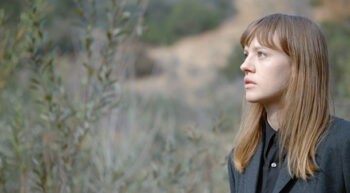 A: When I was writing the songs I actually was imagining it more of like an internal, psychological expedition. It wasn’t until half way through the process that I began to open up the possibility of working with my wife Mary (Pearson Andrew) on the lyrics and the overall concept of the record. With her help and also the help of the video director, art director who we worked with called Clemens (Habicht), we together began to imagine this inner psychological journey as more of an outward space expedition. There was a way to realise the same ideas but with a more broader and more cinematic possibility. So as I had begun writing it this way, it started to develop in a whole other way with the help of this other input which was also a really new thing for me. But eventually we were realising the visual side of things and then going back and adjusting the way the album flowed and connected and began to really think about it as a screenplay, trying to find a narrative arc that goes through the record for the listener to latch onto.
A: When I was writing the songs I actually was imagining it more of like an internal, psychological expedition. It wasn’t until half way through the process that I began to open up the possibility of working with my wife Mary (Pearson Andrew) on the lyrics and the overall concept of the record. With her help and also the help of the video director, art director who we worked with called Clemens (Habicht), we together began to imagine this inner psychological journey as more of an outward space expedition. There was a way to realise the same ideas but with a more broader and more cinematic possibility. So as I had begun writing it this way, it started to develop in a whole other way with the help of this other input which was also a really new thing for me. But eventually we were realising the visual side of things and then going back and adjusting the way the album flowed and connected and began to really think about it as a screenplay, trying to find a narrative arc that goes through the record for the listener to latch onto.
M: I guess that’s why you must have made the videos for Sekwar and the Big Appetite, they follow each other on the album as well so is there a connection with watching the videos do you think?
A: Yeah that’s right so there were three videos made it’s Sekwar, Big Appetite and one that follows is also sequential on the album which is From What The Never Was. And it turned out the way that it was imagined was that actually From What The Never Was, the last one, would actually be the prequel so would be the first in the series and then that leads into Sekwar and then finally Big Appetite. So that’s the narrative sequence of the visual works that way but on the record it’s still as I imagined it where From What The Never Was sort of becomes this moment of remembering where you’re from or a moment of understanding in the record that there’s been a journey and so that’s how it fit in.
M: You kind of portrayed, especially in Big Appetite, kind of almost a psychotic or a madman persona when you’re delivering your lyrics, is that the plan? Is that what you’re trying to get after?
A: Yeah, that song in particular, it sort of jumped out from the others initially even because it was ten minutes long when we were first making it. But it feels it’s a very powerful, I hate to describe it but it’s sort of a masculine feeling of it, which for me placed it in this sort of negative space or a negative connotation. And in the record in the context of the record, it’s the thing that I suppose that we fear the most, when society has gone to its absolute end. So that song represents that point in the arc of the record.
M: You mentioned you have Mary collaborating with the lyrics. Does she bring a more feminine side of the music if you’re talking about the masculine one and non-masculine one? What was it like collaborating with her?
A: Yeah, well that’s exactly right. When I come to think about it I was just sort of like, how could I have written so much in the past without maybe trying to understand the female perspective of what I had been writing, do you know what I mean? So the opportunity to have that perspective was really like a fresh, open window where suddenly there was another way of looking at everything and it kind of allowed that to be the premise of the way a lot of the songs were written, sort of reconsidering them from different viewpoints.
M: So is this kind of a jumping off point of a new version of Liars do you see it? Is this a continuation of something that’s going to happen are you thinking in the future now working with the same people and the same method?
A: Well, I mean currently just at the moment we’re all locked down. But in a way that offers a real opportunity to quickly try and capture the same magic with the same group of people. That’s a really exciting thing that we are talking about. So my hope is that I never really have a plan for where things are going, it’s just better to see how they work. But at the moment as I said because of the circumstances it seems like it would be great to make something immediately.
M: When you do get a chance to perform live, how is that going to be presented do you think?
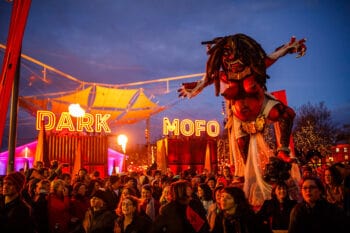 A: We did actually get some shows in before…we played Dark Mofo just before the lockdown so it was great to get out there and I’ve been playing with Cameron and Laurence on stage and when we do those shows it really is amazing. We’ve only been able to do it a couple of times now but its super exciting, its this situation where I really only want to play the new material because it just feels so right.
A: We did actually get some shows in before…we played Dark Mofo just before the lockdown so it was great to get out there and I’ve been playing with Cameron and Laurence on stage and when we do those shows it really is amazing. We’ve only been able to do it a couple of times now but its super exciting, its this situation where I really only want to play the new material because it just feels so right.
M: Maybe you can come to New Zealand and play once the bubble is rebuilt or whatever…man it’s a mess.
A: I would love that. I’ve never been to New Zealand.
M: Really? We’re right around the corner, just across the pond.
A: That’s what they say.
M: Well thank you so much for spending time talking to me, loved hearing about how this is made so hopefully this will continue on and we’ll see you at some point.
A: Thanks Marty, I appreciate talking to you and hopefully we can meet in real life one day.
